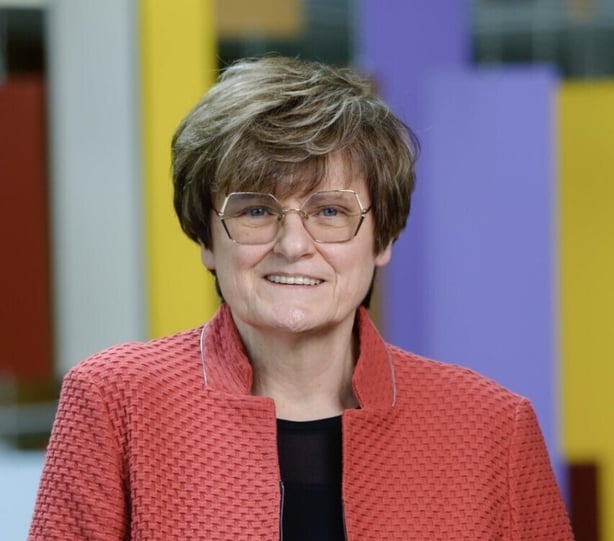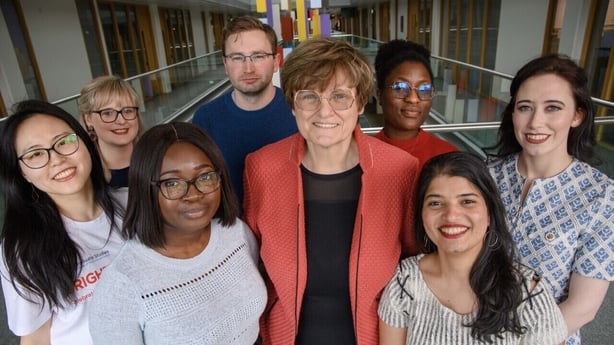An honorary doctorate is being conferred by University College Cork on Dr Katalin Karikó, the researcher whose work is credited with paving the way for the discovery of the Pfizer-BioNTech and Moderna Covid-19 vaccines.
Dr Karikó, a Hungarian-American biochemist, is currently professor at University of Szeged in Hungary and adjunct professor of neurosurgery at the Perelman School of Medicine, University of Pennsylvania in the US.
For her research work on mRNA, the genetic code that carries DNA instructions to cells, she has received many awards, including the Japan Prize, the Horwitz Prize, the Paul Ehrlich Prize, the Benjamin Franklin Medal, the Canada Gairdner International Award, the Kovalenko Medal, the Tang Prize, the Warren Alpert Prize, the Princess Asturias Award, the BBVA Frontiers Award, The German Future Prize, the Breakthrough Prize and the Lasker-DeBakey Clinical Medical Research Award.

Dr Karikó is being presented with her honorary doctorate at a ceremony at UCC during World Immunisation Week.
Dr Karikó's work over three decades has been driven by her belief that mRNA could be used to make its own medicine.
She crucially discovered how to overcome the potentially lethal inflammatory response caused by synthetic mRNA that had precluded its use in humans.
UCC said the presentation of an honorary doctorate recognises Dr Kariko’s discovery of this revolutionary mRNA technique and her outstanding contributions to science, despite facing grant rejections and funding uncertainty.

In advance of her honorary conferring Dr Karikó is meeting with UCC medicine and health students and researchers.
UCC President, Professor John O'Halloran, said: "The personal and professional perseverance of Dr Karikó to develop the science that protected our world is deeply inspiring. It is a great honour and privilege to award this honorary doctorate to Dr Katalin Karikó, a true pioneer".
"With unrelenting determination and courage, Dr Karikó has made an enormous contribution to the fight against viral diseases and turned the tide of the pandemic," he added.
Professor John Cryan, UCC Vice President of Research and Innovation, described Dr Kariko's story as one of persistence and belief.
"Dr Kariko is an inspirational role model for everyone involved in basic research and its translation into innovative solutions for global problems," he said.
"As we embark on our Futures-Future Medicines initiative here in UCC, we are deeply motivated by her research and the power of RNA-based medicines which offer promise for other conditions beyond viral infections, including cancers and rare diseases that were previously undruggable. She has enabled future medicines to arrive today," he stated.
Dr Karikó said she was looking forward to meeting students at UCC.
"I am deeply honored to learn that leaders of University College Cork are awarding me an honorary doctorate," she said.
"I am delighted to accept this prestigious recognition and looking forward to visiting the university campus, meeting the students and professors during my first time travel to Ireland," she added.
Initiative
In 2021, a team of UCC researchers led by Professor Atkins, together with Swiss collaborators, made a discovery that highlighted a potential drug target against the Covid causative virus.
The pioneering work of Professor Caitriona O’Driscoll and Dr Piotr Kowalski is focused on developing innovative solutions to deliver RNA-based therapeutics.
UCC says the challenge for RNA-based researchers at the college is to develop RNA medicines for chronic diseases where current treatments have reached a therapeutic ceiling and urgent needs exist to develop new innovative and targeted therapies.
It says this goal is the focus of UCC's Futures–Future Medicines initiative, launched in 2022, which is recruiting world leading scientists, engineers and clinical investigators at the university and its affiliated hospitals to deliver high-impact, transformational, next generation medicines and medical technologies.







